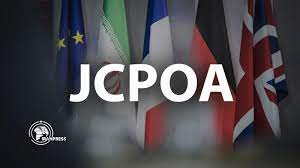Iran-US deadlock over nuclear capability

- Copyright infringement is not intended
The story so far: After a gap of five months, Iran, Russia, China and the European countries resumed negotiations in Vienna to revive the 2015 nuclear agreement, known as the Joint Comprehensive Plan of Action (JCPOA).
- As Iran has refused to hold direct talks with the U.S., European officials will shuttle between the Iranian and American delegations, exchanging talking points and seeking common ground.
Issue in brief:
The 2015 JCPOA agreement
- It sought to cut Iran off a possible path to a nuclear bomb in return for lifting of economic sanctions.
- Iran agreed to cut its stockpile of enriched uranium by 98% to 300 kg and keep them at a low purity level of 3.67%. In return, the Obama administration lifted sanctions.
- Restrictions were introduced on the number of centrifuges it could keep and Iran agreed to open all its facilities to the inspection of the International Atomic Energy Agency (IAEA).
What triggered the current crisis?
- In May 2018, U.S. President Donald Trump, unilaterally pulled the U.S. out of the nuclear deal despite the UN certification that Iran was complying with all the terms of the agreement.
- Critics of the deal argued that the agreement was inadequate to address Iran’s growing influence in the region , would pose fresh challenges to America’s allies in West Asia.
- The Trump administration also wanted to negotiate Iran’s ballistic missile programme as part of a new agreement.
- After pulling out of the JCPOA, the S. reimposed sanctions on Iran and then invited Tehran for talks.
- Iran refused to talk with the Trump administration and resumed its nuclear programme.
Where do talks stand now?
- Joe Biden, had appointed a special envoy for Iran. Indirect talks with Iran through Europeans started immediately. But no agreement was reached after six rounds in Vienna.
- Iran has substantially stepped up its nuclear activities since 2019. It has installed more than 1,000 more advanced centrifuges at its plants, which can enrich uranium more quickly.
- Iran has also started enriching uranium to 20% purity or more, which is a technical step away from the weapons grade level.
- Iran is ready to return to the deal but it wants the U.S. to remove all the sanctions first and give assurances to Tehran that a future American leader would not renege on the promises as Mr. Trump did.
India-Iran
- Iran-India relations are of vital importance for India strategically because of Iran's Chabahar port, which plays a fundamental role in India's trade connectivity with Afghanistan, Central Asia, Eurasia and Europe.
- India being the second largest importer of crude oil from Iran has begun to effectuate a plan to ensure that there is no shortage in supply by increasing imports from other countries.
- The immediate impact of the sanctions on India was that it can no longer use US dollars for transactions with Iran.
- Investment by Indian companies in Iran's oil and gas development projects and pipeline projects, not permitted to open new US bank accounts and facing restrictions on loans, licences and Ex-Im credit.
- In December 2018, India and Iran agreed to revive its 2012 rupee-rial payment mechanism to receive payments in Indian rupee, where half of the payments would be used to import products from India.
Impacts of sanctions on India:
- Cutting down crude imports from Iran will impair India’s energy-security needs affecting inflation and slow down economic growth.
- In the absence of Indian infrastructural development projects in Iran, the vacuum created is likely to be filled by China amid fast-changing geopolitics.
- India’s policy towards Iran and developments in the Middle East has been largely reactive.
- In the backdrop of tensions between US and Iran, India has had to re-adjust its own relations with Iran while maintaining strategic ties with US and Israel.
- India needs to emerge out with a clear foreign policy and choose an alliance to not only safeguard its interests but also to play an active role on the international stage.



1.png)
